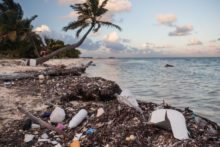The PRI (UN Principles for Responsible Investment) published new guidance for investors on how to engage with companies on plastic waste and pollution. With expert contribution from the Ellen MacArthur Foundation, the Investor Engagement Guides set out how investors can address the challenge of plastic waste and pollution by engaging with companies along the plastics value chain, and assessing their circular economy performance.
The guidance is the first comprehensive and practical framework for investors to mitigate risks related to investments in plastic packaging, and focuses on four key sectors across the plastics value chain:
- petrochemicals
- containers and packaging producers
- fast-moving consumer goods (FMCGs)
- waste management
Innovation, customer preferences, and stricter legislation are rapidly transforming the plastics sector and creating opportunities and risks for investors. By engaging with large users, producers, and recyclers of plastic packaging and asking them to take action on their portfolio, investors have an opportunity to address plastic waste and pollution. Using the New Plastics Economy Global Commitment as a framework, the guides will increase pressure on businesses to adopt circular economy principles, set ambitious time-bound targets, and report transparently on progress towards a circular economy for plastic.
Plastics: What risks are investors exposed to?
When analysing the plastics value chain, investors need to understand that they and their investee companies are exposed to a range of risks, including:
- Policy and regulatory risks: many developed and developing countries are regulating – or in some cases banning – certain plastics. Companies that rely on plastics could also face higher taxation, extended producer responsibility fees and increased raw material costs.
- Reputational risks: companies that are heavily reliant on plastics face growing scrutiny and potentially significant reputational damage, as consumers become increasingly aware of the impacts of plastic pollution. Packaging has been the target of several campaigns against plastic.
- Climate-related risks: projections suggest that emissions from plastic could account for 10% – 13% of the Earth’s remaining carbon budget by 2050 if plastic production and use grow as currently planned.
- Wider environmental risks: mismanaged plastic waste contributes to waterway and ocean pollution, which clogs urban infrastructure and degrades natural systems, such as the ocean. The cost of such externalities to society, when considered alongside the greenhouse gas emissions of plastic packaging production, is conservatively estimated to amount to US$40 billion annually.
- Human health risks: microplastics, which have been detected in bottled water and the tissue of fish and other marine life, may have negative health impacts when ingested by humans. These are not yet fully understood but if they are determined, may cause heightened societal concern and health-related restrictions on plastic use if detected in the future.






